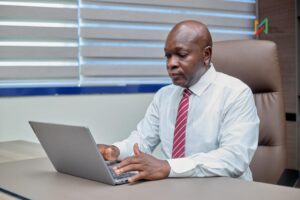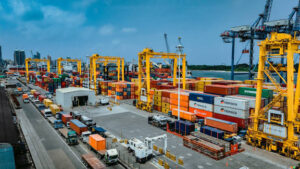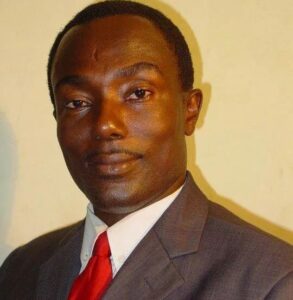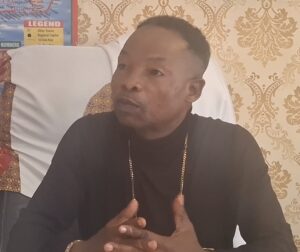
Empty Ghanaian streets during lockdown
By Isabella Agyakwa
The idea of a lockdown, globally, is to flatten the curve of COVID-19 transmissions and return lives to normalcy.
When President Nana Addo Dankwa Akufo-Addo announced the lifting of the three-week restrictions on the movement of persons in Kasoa, Accra, Tema and Kumasi, I saw a video of some young men jubilating in the street.
In case this youth did not hear the President well, let me draw their attention to another portion of the statement which outlined the pre-condition for the lifting of the partial lock down. President Akufo-Addo, in his 7th address, stated, “…should there be an unexpected outburst in infections within a community, I have put the health workers and the security services, including the Police Service and the Armed Forces, on standby, to co-ordinate a rapid response of human and logistical resources, if necessary, to cordon, impose a curfew, trace, test and treat infected persons in the affected community.”
“We will continue to monitor closely events in some hotspots in the Greater Accra Metropolitan Area like Weija-Gbawe, Ga East, and Ayawaso East Municipality, and Tema Metropolis, and in the Eastern Region, like Asuoygaman and Lower Manya Krobo Districts. Whenever the situation so warrants, a community in which the virus is identified as becoming prevalent will be locked-down, until there is a clear understanding of the trajectory of the virus that will allow us to contain it,” the President added.
It is important to state that the President is not the first World leader to make such a decision. He is in the company of the Prime Minister of Denmark, Ms Mette Frederiksen.
Announcing the relaxation of the lockdown imposed in her country, she stated: “This will probably be a bit like walking the tightrope. If we stand still along the way we could fall and if we go too fast it can go wrong. Therefore, we must take one cautious step at a time. If we open Denmark too quickly again we risk that infections rise too sharply and then we have to close down again.”
Similar to the announcement of the Ghanaian leader, the Danish Premier upheld other restrictions, including the ban on gatherings of more than 10 people until at least May 10, and on larger gatherings until August. Denmark has reported 187 coronavirus-related deaths and total of 4,681 infected out of a population of 5.6 million.
Lifting the ban
The idea of lifting the lockdown is justifiable because if the restrictions had continued, the populace, especially the vulnerable, will suffer from other circumstances such as illness or death not because of the coronavirus but from other sources, including hunger.
But is the total lifting of the ban what Ghana needs at the time where the cases are on the rise as a result of the enhanced testing, although other restrictions such as the suspension of all public gatherings among other things are still in place?
As at Sunday 26 April 2020, the number of persons tested positive for the disease had shot up to 1,550, with 155 persons having recovered and 11 deaths.
There are indications that the country would record more cases, hence the public has been advised not to take anything for granted as there is no known cure for the virus and letting down our guards could cause infections to spread like wildfire.
During the lockdown period, some residents in communities in the Greater Accra Region were seen flouting the directive and little or no efforts were made to avert that situation, despite numerous media reportage.
The question that confronts authorities is how to manage the lifting of the partial lockdown in a country, which is heavily dependent on the informal sector for employment. Therefore, person-to-person contact is inevitable.
To the average Ghanaian, the lifting of the ban means life partially returning to normalcy. Therefore they are able to make the decisions they want and, as religious as we are, cover ourselves with the blood of Jesus and face masks. It came as no surprise that while some persons were calling for the ban to be lifted, others preferred a total lockdown for the government to manage the death and infection rate.
President Nana Akufo-Addo, at a meeting with the Trades Union Congress (TUC), gave ample indication that his administration does not consider the lifting of the ban as an end in itself. He said his administration was still weighing the options available and their respective consequences on the nation at large, saying, “… a responsible government is required to look at these before decisions are made and that is the exercise on which we are currently engaged.”
Economic impact
Most economists, who have commented on the lifting of Ghana’s partial lockdown, are of the opinion that it is the way to go as it will protect the economy and jobs in the country.
Presently, the pandemic has a direct impact on economies because it is slowing down global economic growth and, by extension, curbing Ghana’s own growth potential within the global economy.
Data from the Ghana Statistical Service (GSS) indicate that the producer inflation, for March 2020, has declined for the second consecutive month to 6.8 per cent, from 11.8 per cent recorded in February, 2020, representing a 3.7 percentage point decrease in producer inflation relative to the rate recorded in February 2020.
This largely could be attributed to the prices of goods shooting up, largely because of panic buying and majority of companies being closed during that period, accounting for a short supply of goods and services. Mind you, owners of these companies had to pay for labour, resulting in expenditure without productivity.
There is also the case of persons who make a living from daily sales of their wares but were compelled to stay at home because of the directive. These persons make no income and are not paid any money because they are not salary workers. Meanwhile, majority of these people are breadwinners of their homes.
The hope is that the monetary interventions such as GHC600 million soft loan scheme, with a two-year repayment plan for micro, small and medium scale businesses, put in place by the government will help cushion businesses as Ghana joins the world to fight the virus. But how about those who are likely not to benefit from the President’s intervention but were hit economically as a result of the lockdown. I believe the government should try and make provision for these people as well.
The endgame
The endgame would be a vaccine that is widely available, effective and affordable and since none is available, the onus lies on us as individuals to ensure a sense of selflessness, self-control and self-discipline.
It is important to stress strongly that coming out of the partial lockdown in Accra and Kumasi does not mean we are out of the pandemic.
We must obey the measures still in place, including the new ones, because we know our survival depends on them, and the harder we are on ourselves in obeying them, the quicker and more enduring will be the victory.






